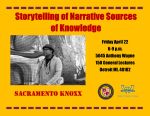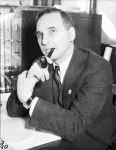Blogs
Tech Talk -- Social Media Outreach
The Reuther Library’s Facebook presence has been alive and well since our first posts were submitted back in 2009. Over the course of our nearly seven years of use read more »
Event: Sacramento Knoxx and Storytelling as History
The 5th event in our series “Latino Americans: 500 Years of History” will take place at 6pm this Friday, April 22, as part of the Wayne State University Center for Latino/a and Latin American Studies’ Academia del Pueblo!
Join us in General Lectures room 150 for an exploration of storytelling and narrative evidence. We’ll feature a performance from Sacramento Knoxx, who will share his new piece on Southwest Detroit.
We will also discuss the future of the Detroit area's archival records in a panel:
"What Do We Need to Document Our Community's History Into the Archives?" read more »
The Southern Airways strike of 1960: ALPA’s epic battle over fair wages for pilots
By the late 1950s, it was becoming increasingly clear that the Air Line Pilots Association (ALPA) would have to strike against Southern Airways (SOU). The main issue was wages. The union maintained that all of their aviators should receive the same salary regardless of the size of the airline, but SOU, a smaller, regional carrier, claimed they could only afford to pay a lower rate. ALPA knew this was a battle they had to take on, though it would not be easy. Frank Hulse, the founder and president of SOU, was staunchly anti-union, and had recently succeeded in breaking up the mechanic’s union at Southern Airways. ALPA was the last union standing at SOU. read more »
Guest Post: More than a Lawyer - Maurice Sugar
“Music hath charms to sooth a savage heart, to soften rocks, or bend a knotted oak.” –William Congreve 1670-1729
This quote, among others, was scribbled on notes belonging to the famous and first Labor Lawyer –Maurice Sugar, and can be found in the Reuther Library’s Maurice Sugar Papers. read more »



